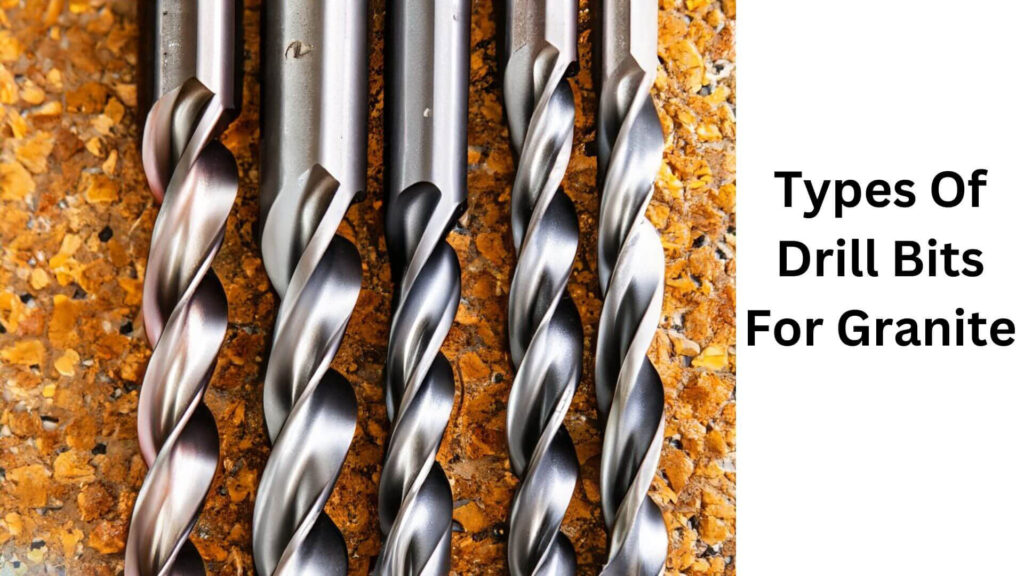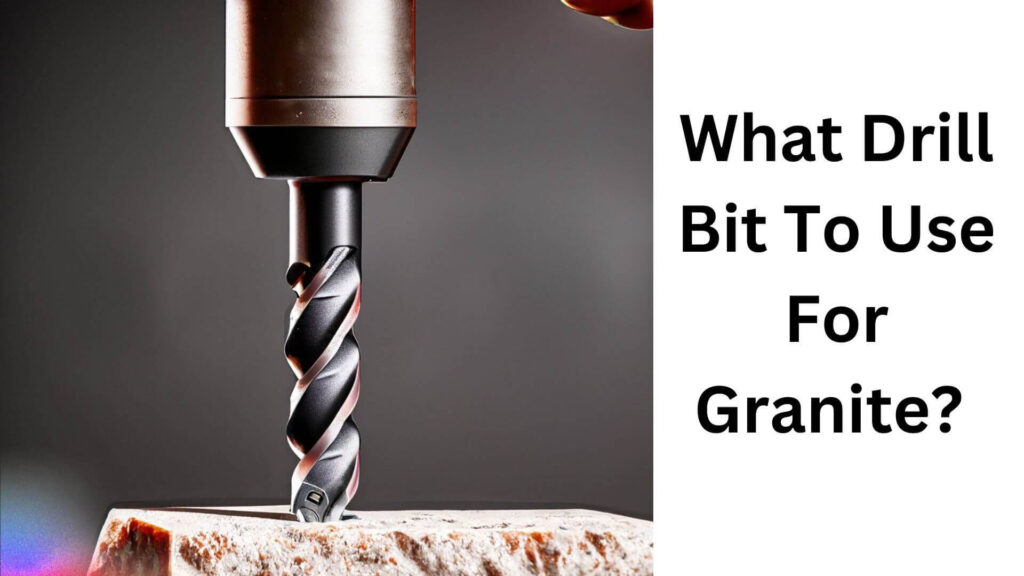Use a diamond-tipped drill bit for granite. Drilling into granite requires special tools due to its density and hardness.
Granite is a tough stone material that can only be drilled successfully with a diamond-tipped drill bit. Using other drill bits can damage the material or wear out the bit quickly.
Diamond drill bits are made with denser material designed to create smooth holes without cracking or chipping the granite.
When drilling into granite, using water as a lubricant is essential to help prevent heat buildup and keep the bit cool.
Finding the right diamond-tipped drill bit for the job can make all the difference between a successful project and a costly mistake.
Table of Contents
Types Of Drill Bits For Granite

Granite, a popular countertop choice, demands the right drill bit. Choosing the right drill bit for granite can be daunting, so knowing the types of drill bits for granite will help you select the best one for your needs.
Here I’ll explore two types of drill bits for granite: diamond core drill bits and carbide-tipped drill bits.
1. Diamond Core Drill Bits
Diamond core drill bits are the perfect choice for drilling granite due to their durability and efficiency. Here are some critical points about diamond core drill bits for granite:
- Made of high-quality, industrial-grade diamonds, which makes them highly durable
- Ideal for drilling granite and other hard materials
- Work well for professional drilling applications
- Available in a range of sizes and shapes to fit different tools
- Ensure that the drill bit is adequately lubricated to guarantee longer life
2. Carbide Tipped Drill Bits
Carbide-tipped drill bits are another drilling option for granite. Here are some essential things to know about carbide-tipped drill bits:
- Made of high-speed steel and carbide, which gives them a longer lifespan compared to other types of drill bits
- They are less durable than diamond core drill bits but work well for diy projects and small applications.
- Suitable for drilling granite and other hard materials
- Available in a range of sizes and shapes to fit different tools
- For the best results, use lubrication when drilling
When choosing the right drill bit for granite, it is essential to remember the type of project, drilling application, and tool being used. Diamond core drill bits are the best option for professional drilling tasks, while carbide-tipped drill bits are fitting for diy projects and small applications.
Ensure adequately lubricate the drill bits for a longer lifespan and better drilling outcomes.
Read More: The 8 Best Drill Bit Options For Granite Projects
Factors To Consider When Choosing Drill Bits For Granite
Granite is a popular and durable material used in construction, decorating, or remodeling; however, drilling a hole into its surface can be tricky if you need the proper tools. Using the wrong drill bit may cause damage to the material, and it might even break the drill.
Therefore, when choosing a drill bit for granite, it is essential to consider the following factors:
1. Type Of Granite
- Granite is classified into hard, medium, and soft based on mineral composition and density.
- For hard granite, diamond-tipped drill bits should be used as they can withstand the friction generated by the hard surface.
- Carbide-tipped drills can be used for medium granite, but they may need to be more efficient for drilling multiple holes.
- High-speed steel (hss) drills can be used for soft granite, but diamond-tipped drill bits are more vital than they are.
2. Thickness Of The Granite
- The granite slab’s thickness should also be considered when choosing a drill bit.
- For thick granite, diamond-tipped drills with a large diameter should be used to prevent overheating of the drill.
- A smaller diamond-tipped drill can be used for thin granite, making the drilling process smoother and more straightforward.
3. Purpose Of The Drilling
- The purpose of drilling is another factor to consider when choosing a drill bit for granite.
- If making a hole for a sink or faucet, the drilling should be done with a diamond-tipped hole saw. It won’t damage the granite surface and will cut through the slab seamlessly.
- If drilling multiple holes for a backsplash or a countertop, diamond-tipped drill bits can be used, but they may wear out faster than carbide-tipped drills, requiring more frequent replacement.
Remember always to follow the correct drilling procedures to prevent any damage to the granite surface. Always use safety gear such as goggles and gloves, and stay vigilant while using powerful drills. You can achieve the perfect result for your project with the right drill bit for granite and the proper techniques.
Read More: Cutting Granite Holes Made Easy: Expert Tips and Techniques
How To Drill Into Granite?
1. Safety Precautions To Take Before Drilling
Drilling into granite requires care and attention, as it can be hazardous. Before beginning the drilling process, make sure to follow these safety precautions:
- Wear safety glasses to protect your eyes from debris and dust.
- Wear ear protection to safeguard against the loud noise from the drill.
- Use a dust mask to prevent inhalation of granite dust.
- Wear gloves to improve your grip on the drill and reduce the risk of hand injury.
- Keep the area around you clean and free of any tripping hazards.
- Ensure that the power supply to the drill is switched off when changing drill bits.
- Do not attempt to drill near electrical wires, plumbing, or gas lines.
2. Step-By-Step Guide On How To Drill Into Granite
Now that you have taken the necessary safety precautions, follow these steps to drill into granite successfully:
- Mark where you want to drill with a pencil or masking tape.
- Place the drill bit into the drill, ensuring it is secure before proceeding.
- Apply light pressure and rotate the drill bit clockwise at medium speed to start drilling.
- Keep the drill bit at a 90-degree angle to the granite piece.
- Continue drilling until the required depth is reached.
- After you have completed drilling, turn off the drill and remove the drill bit.
3. Tips And Tricks To Prevent Damage To The Granite During The Drilling Process
Here are some tips to help you prevent damage to the granite during drilling:
- Ensure that the drill bit is the right size for the hole you wish to create.
- Use water or a cooling lubricant to keep the drill bit cool, reducing the risk of overheating and damage to the granite.
- Drill slowly when using a diamond-coated drill bit to improve its lifespan.
- Start with a small pilot hole before drilling the hole to avoid any slippage or damage to the surface of the granite.
- Always apply light pressure when drilling to avoid cracking or chipping the granite.
- Take frequent breaks to prevent overheating of the drill and ensure that the granite remains cool.
- Clean the drill bit regularly to maintain its sharpness.
By following these safety precautions, step-by-step guides, and tips and tricks, you can successfully and safely drill into your granite piece without causing any damage.
Maintenance Of Drill Bits
Drilling into granite can be challenging, but with the right drill bit and proper maintenance, it can be done easily. In this post, we’ll be focusing on the maintenance aspect and how to ensure that your drill bits are in top condition.
Maintaining drill bits having sharp and clean drill bits is crucial for efficient and effective drilling. Here are some reasons why it’s essential to maintain your drill bits:
- Dull and dirty drill bits can cause damage to your drill and reduce its lifespan.
- They can create unwanted burrs or chips on the surface you are drilling, affecting the quality of the final product.
- It can also cause slow and inefficient drilling, wasting time and effort.
How To Clean And Sharpen Drill Bits
Cleaning and sharpening your drill bits doesn’t have to be complicated. Here are the steps to follow for proper maintenance:
Cleaning
- Remove debris or material from the drill bit using a wire brush or compressed air.
- Dilute a small amount of dish soap in warm water and soak the drill bit for 10-15 minutes.
- Use a toothbrush to scrub the bit, removing all dirt and grime gently.
- Rinse the bit with clean water and dry using a clean cloth.
Sharpening
- Use a bench grinder or sharpening stone to point your bit.
- Hold the bit at an angle between 59-68 degrees and rotate it against the stone/grinder.
- Ensure that you remove an equal amount of material from each bit’s cutting edge to maintain balance.
- Once sharpened, remove any burrs or rough edges using a honing stone.
Proper Storage Of Drill Bits
Proper storage of your drill bits can significantly extend their lifespan. Here are some tips for storing your bits:
- Store them in a dry, cool place to avoid moisture build-up and corrosion.
- Keep them organized in a dedicated container for easy access and to prevent them from getting damaged.
- Use protective covers or sleeves to prevent them from chipping or rubbing against each other.
Maintaining your drill bits may seem minor, but it can save you time, effort, and money in the long run. Following these simple maintenance steps, you can keep your drill bits in top condition and achieve efficient and successful drilling.
Frequently Asked Questions Of What Drill Bit To Use For Granite
What Drill Bit Is Best For Granite?
A diamond-tipped drill bit is best for granite due to its hardness.
Can You Use A Regular Drill Bit On Granite?
No, regular drill bits are not suitable for drilling on granite.
What Is The Size Of Drill Bit For Granite Countertop?
A 1/4-inch or 3/8-inch diamond-tipped drill bit is recommended for standard mounting holes.
Can You Drill Holes In Granite Without Water?
No, drilling into granite without water can cause heat buildup, damaging the drill bit or the granite.
How Do You Keep A Drill Bit From Slipping On Granite?
Use a center punch to make a slight indentation on the spot where you want to drill. This will help the drill bit stay in place and prevent slipping.
Final Verdict
As a diy enthusiast or a professional contractor, you must recognize the importance of choosing the right drill bit for your granite projects. Working with granite requires precision, patience, and the tools to achieve perfection.
The choice of drill bit comes down to the nature of the project, your budget, and, most importantly, the type of granite you are drilling.
Knowing the type of granite and its hardness level will help you choose the right drill bit. Investing in high-quality drill bits specifically designed for granite is essential to avoid damaging the material and ensure that your project lasts for years.
Always wear protective gear and work slowly to avoid damaging the drill bit or chipping the granite. Selecting the right drill bit for your granite project is crucial and can mean the difference between success and failure.

Hey, I am Shihab Uddin, I’m a huge fan of DIY crafts. My workshop is where I spend most of my spare time, and I’m always working on some project. To that end, I’d like to share some of my knowledge and experience with you in power tools, woodworking, and other specialized materials fabrication.
I will guide you with genuine knowledge that can assist you with deciding whether a drill is appropriate according to your requirements or not. If you want to find the best drill and know which type of drill is most suited for your needs, then I can guide you with my expertise. My passion lies in helping others find the correct products they need at an affordable price.


